 With Britain’s nuclear deterrent, the Trident system, becoming an important issue in the general election campaign, Ben Clements investigates party supporters’ views over time towards nuclear weapons. He finds a general trend of declining support for Britain having her own nuclear weapons, with Conservative and UKIP supporters tending to stand apart from the other groups in holding positive views.
With Britain’s nuclear deterrent, the Trident system, becoming an important issue in the general election campaign, Ben Clements investigates party supporters’ views over time towards nuclear weapons. He finds a general trend of declining support for Britain having her own nuclear weapons, with Conservative and UKIP supporters tending to stand apart from the other groups in holding positive views.
The general election campaign in recent days has seen heated debate between the parties over the Trident issue, the salience of which has been heightened by how the parties’ positions’ on the issue – particularly in relation to the SNP – would be reconciled in the context of any post-election process of negotiation and bargaining to form a government. The Conservative defence secretary, Michael Fallon, claimed that Labour would use Britain’s nuclear deterrent as a ‘bargaining chip’ with the SNP, who oppose renewing the Trident missile system. The Tories and Labour are both in favour of renewing Trident, although a recent poll of Labour prospective parliamentary candidates showed three-quarters opposed renewal. The Lib Dem’s current position is to end the current arrangements of having continuous at sea nuclear deterrent allowing the number of nuclear-armed submarine to be reduced. A cross-party commission on Trident, which reported in July 2014, concluded in favour of renewal. Previous general election contests have also seen the parties’ positions on – or handling of – defence issues become the object of debate and disagreement, including the issue of nuclear disarmament. In 1983 and 1987, the Labour Party campaigned on a platform of unilateral nuclear disarmament.
Given the history of party-political disagreements over defence in general and nuclear weapons in particular, this post sheds light on party supporters’ views over time (a broader review of the party-political context and public opinion surrounding the Trident issue is available here). It focuses on their positional attitudes on the nuclear weapons debate, rather than evaluation of the parties’ broader reputation on defence policy (long-term polling data from Ipsos MORI shows that the Conservative Party has traditionally had an advantage in perceptions of which party is best able to handle the broad issue area of defence, disarmament and nuclear weapons).
Attitudes over time
The longest time-series of data comes from the British Election Study (BES), where a question on nuclear weapons was asked on various surveys conducted between 1964 and 1997. It asked whether Britain should retain its own nuclear weapons, only have nuclear weapons within a West European defence system, or should have nothing to do with them. The views of party identifiers (Conservative, Labour, Lib/Alliance/Lib Dem, none) are shown in Table 1. There is a general trend of declining support for Britain having her own nuclear weapons (and also within a West European context, for most groups). Support for Britain having nothing to do with nuclear weapons rises over time. That said, Conservative supporters are consistently more likely to say that Britain should keep her own nuclear weapons. Across the decades, Labour, Lib Dem and those with no party identity are markedly more likely to express the view that Britain should not have anything to do with nuclear weapons.
Table 1: Attitudes towards Britain having nuclear weapons, by party identification, 1964-1997 (BES)
Source: British Election Study. Weighted data.
Question: ‘Do you think Britain should keep her own nuclear weapons, independent of other countries?’
Conservative party supporters’ more positive views towards the possession of nuclear weapons are borne out by evidence from several questions asked in British Social Attitude surveys (BSA) from 1983 to 1994 (shown in Table 2). Responses to each question over time show a consistent pattern: Conservative supporters tend to stand apart from the other groups. First, Conservative identifiers are always less likely express support for their country pursuing a strategy of unilateral nuclear disarmament, with only very small minorities taking this position. Secondly, Conservative identifiers are always much less likely to perceive that Britain having its own nuclear weapons would make the country less safe. Thirdly, and similarly, Conservative supporters also registered lower levels of agreement with the proposition that American missiles sited in Britain would make the country less safe.
Table 2: Attitudes towards nuclear weapons, 1983-1994, by party identification (BSA)
Source: BSA surveys. Weighted data.
Questions:‘About British nuclear policy. Which comes closest to your own opinion … Britain should rid itself of nuclear weapons while persuading others to do the same OR Britain should keep its nuclear weapons until we persuade others to reduce theirs?’
*1994: ‘About Britain’s nuclear defence policy. Which comes closest to your own opinion … Britain should get rid its of nuclear weapons OR Britain should keep its nuclear weapons until others get rid of theirs OR Britain should always have nuclear weapons’
‘Do you think that having its own independent nuclear missiles makes Britain a safer or less safe place to live?’
‘Do you think that the siting of American nuclear missiles in Britain would make Britain a safer or less safe place to live?’
Contemporary attitudes
Is this historical picture of Conservative identifiers being more positively disposed to Britain having nuclear weapons confirmed by recent surveys? The answer is a clear ‘yes’, but with the added factor that UKIP supporters are similar to Conservative identifiers in their opinions. Table 3, showing responses to a question asked in the BSA 2013 survey, shows that majorities of Conservative and UKIP supporters support Britain having its own nuclear weapons, compared to minorities of other party groups (lowest for the Lib Dems). Just a fifth of Conservative and UKIP supporters are against Britain possessing its own nuclear weapons.
Table 3: Attitudes towards Britain having its own nuclear weapons, by party identification (BSA)
Source: British Social Attitudes survey 2013. Weighted data.
Question: ‘Are you in favour or against Britain having its own nuclear weapons?’
This pattern of responses is also corroborated by data from the BES 2015 study, based on a question asked to a subset of respondents as part of the (preliminary) wave 4 of the panel study component (data are presented in Table 4). Again, Conservative and UKIP supporters stand out for their marked support of nuclear weapons based on the Trident system, with over three-quarters in agreement (as are over half of Labour supporters and those with no party identity). In comparison, less than a third of Lib Dem identifiers are in agreement, as are a fifth of SNP supporters. Three-fifths of SNP supporters express some level of disagreement, only surpassed by the two-thirds of those who support some other party (which reflects the inclusion in this category of supporters of the Green Party, whose position is to get rid of Britain’s nuclear weapons arsenal).
Table 4: Attitudes towards Britain keeping submarines with nuclear weapons, by party identification (BES)
Source: BES 2015 (Preliminary Wave 4; core weight). Dataset obtained from: http://www.britishelectionstudy.com/data-objects/panel-study-data/
Finally, recent polling conducted by YouGov shows a similar breakdown of attitudes across party supporters (based here on current vote intention). Responses to a question specifically asking about renewal of Trident are given in Table 5. Conservative and UKIP voters are much more supportive than Labour and Lib Dem supporters of Trident having a like-for-like replacement. Labour voters are more divided between the three substantive options in the polls, with around three-in-ten always supportive of Britain giving up its nuclear weapons. Lib Dem voters’ distribution is not too dissimilar from that of Labour supporters in two of the polls, although the January 2015 survey shows half of the former wanting Britain to give up nuclear weapons and just one twentieth favouring a like-for-like replacement. Very small minorities of UKIP and Conservative voters think that the country’s nuclear weapons should be given up. The most recent poll, from March 2015, shows that Conservative and UKIP voters are twice as likely as Labour and Lib Dem voters to support an equal replacement for Trident.
Table 5: Attitudes towards the replacement of Trident, by current vote intention (YouGov)
Source: YouGov.
Question: ‘Britain’s current system of submarine launched nuclear weapons, known as Trident, is coming to the end of its useful life and will soon have to be scrapped or replaced. The cost of replacing Trident has been estimated at 20 billion pounds. What do you think Britain should do when Trident reaches the end of its useful life?’
Overall, recent survey-based evidence pertaining to party supporters’ views on the nuclear weapons issue bear out the longer-term attitudinal data. Historically, Conservative supporters have been most supportive of Britain having nuclear weapons and least likely to have been in agreement with unilateral disarmament. Recent polls show that UKIP supporters and Conservative supporters tend to cluster together on the nuclear weapons debate, being much more likely than Labour and Lib Dem supporters to support a renewal of Trident which maintains Britain’s capabilities in relation to nuclear defence.
Note: This article gives the views of the author, and not the position of the British Politics and Policy blog, nor of the London School of Economics. Please read our comments policy before posting. Featured image credit: UK Ministry of Defence CC BY 2.0
 Ben Clements is a Lecturer in the Department of Politics and International Relations, University of Leicester. His research interests include public opinion towards the EU and foreign policy issues; public opinion on environmental issues; religion and socio-political attitudes in Britain. His monograph, Religion and Public Opinion in Britain: Continuity and Change, has just been published by Palgrave Macmillan.
Ben Clements is a Lecturer in the Department of Politics and International Relations, University of Leicester. His research interests include public opinion towards the EU and foreign policy issues; public opinion on environmental issues; religion and socio-political attitudes in Britain. His monograph, Religion and Public Opinion in Britain: Continuity and Change, has just been published by Palgrave Macmillan.


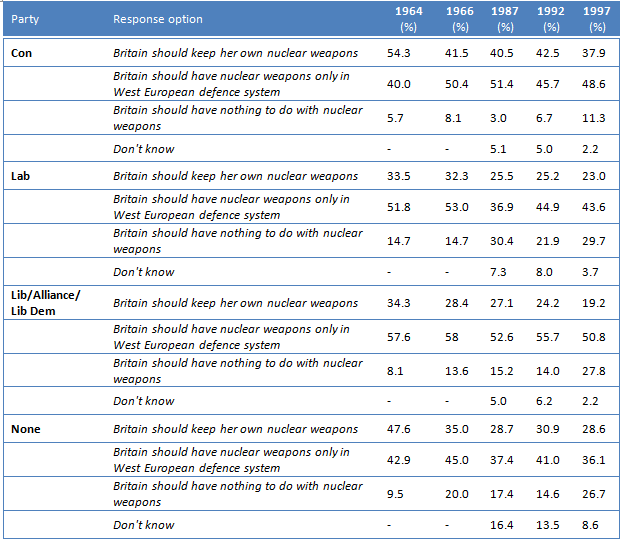
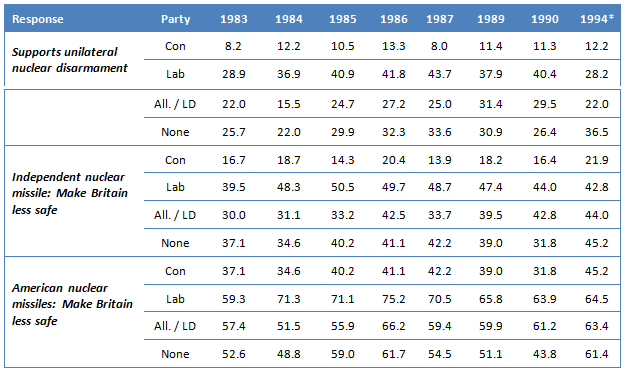
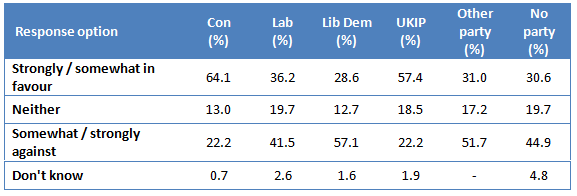
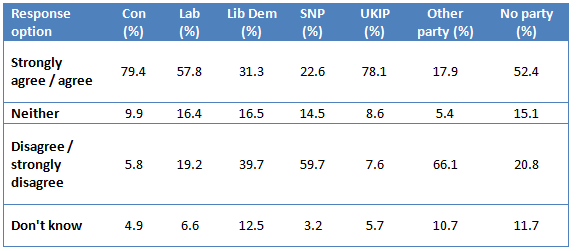
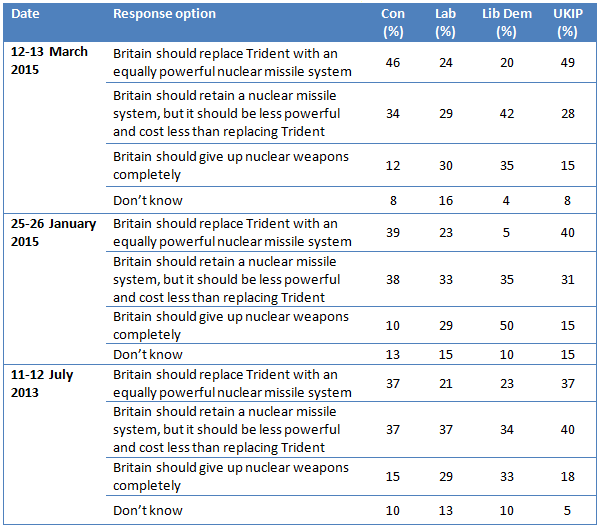




1 Comments